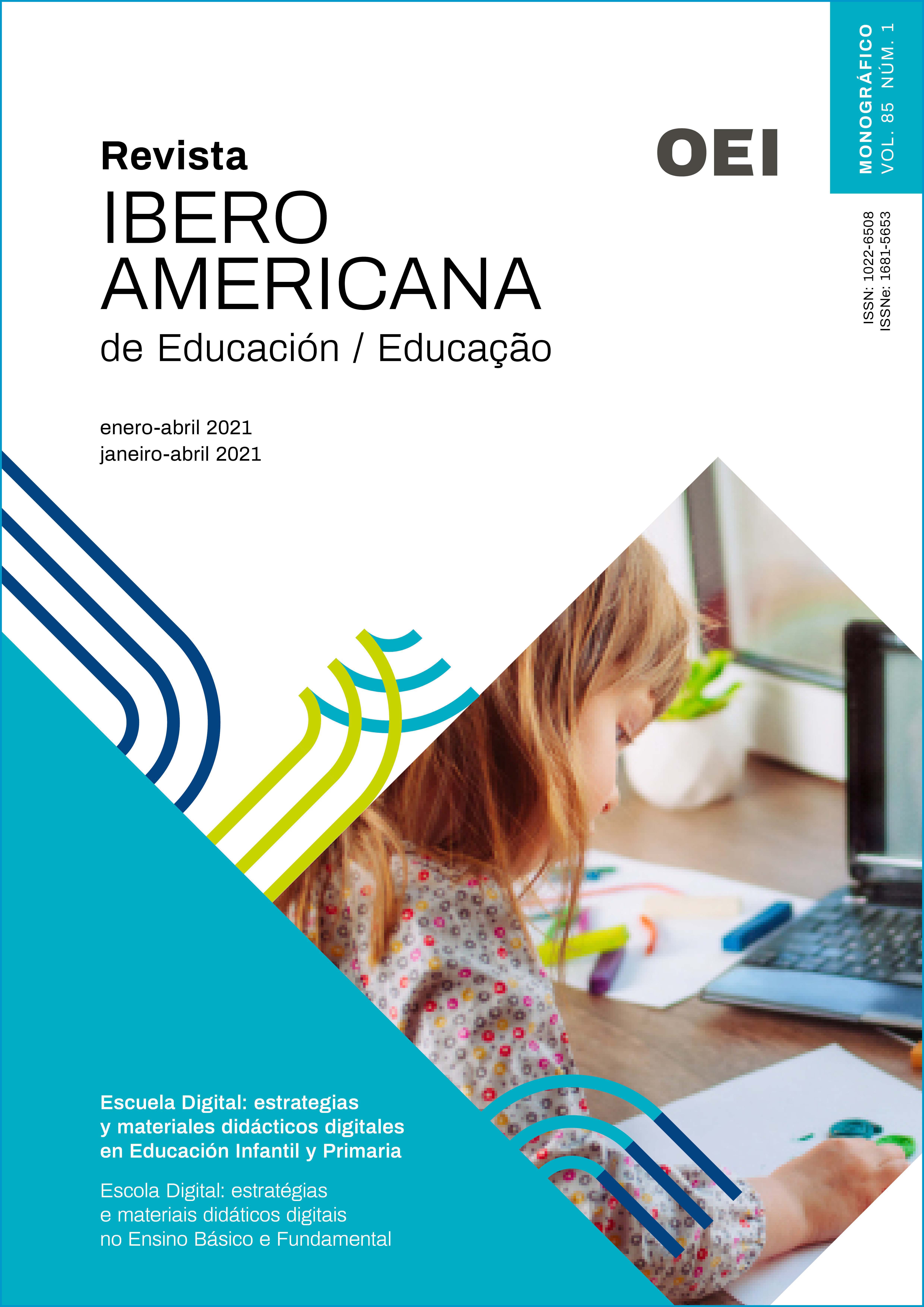Digital teaching materials in early childhood education: analysis of institutional repositories
DOI:
https://doi.org/10.35362/rie8514069Keywords:
teaching material; basic education; digitization; early childhood education; metadataAbstract
Regional educational administrations have launched, within the digitization of teaching and learning processes, the creation of institutional portals that include repositories of materials for teaching whose goal is to support teachers of the different stages, under the collaborative work’s argument. Under this approach, this study aims to analyse a selection of resources for Early Childhood Education that are included in the institutional repositories of Canarias, Galicia and Comunidad Valenciana. Specifically, the analysis focuses on aspects such as the type of resource, the language in which it is offered, the area being worked on, the recommended age, the authorship, the year of creation or the type of license, trying to provide a comparative description of the availability of materials between the different territories. The results show that the materials are, for the most part, digital learning objects, developed in the Spanish language (with an important presence of the regional languages) by individual teachers and without recent updates. In addition, they focus especially on the areas of knowledge of the environment and languages, but are not specific in relation to the age of the students
Downloads
References
Area, M. (2003). De los web educativos al material didáctico web. Comunicación y Pedagogía, 188, 32-38.
Area, M. (2017). La metamorfosis digital del material didáctico tras el paréntesis Gutenberg. RELATEC: Revista Latinoamericana de Tecnología Educativa, 16(2), 13-28. https://doi.org/10.17398/1695-288X.16.2.13
Bardin, L. (2004). Análise de conteúdo. 3ª. Lisboa: Edições.
Baztán, M. (2014). Los materiales didácticos digitales en la enseñanza no universitaria española. Análisis comparativo. Valencia: Ediciones Universitat Politécnica de València.
Bus, A.G., Neuman, S.B. y Roskos, K. (2020). Screens, Apps, and Digital Books for Young Children: The Promise of Multimedia. AERA Open. https://doi.org/10.1177/2332858420901494
Castiello, J.M. (2002). Los desafíos de la educación intercultural: migraciones y curriculum (Tesis doctoral). Universidad de Oviedo.
Cepeda, O., Gallardo, M.I. y Rodríguez, J. (2017). La evaluación de los materiales didácticos digitales. RELATEC: Revista Latinoamericana de Tecnología Educativa, 16(2), 79-95. http://dx.medra.org/10.17398/1695-288X.16.2.79
Chirino, E., Romero, K.E., Castro, J.J. y Etopa, M.P. (2018). Análisis de portales con materiales didácticos digitales: Procomún y EcoEscuela 2.0. En: E. López, D. Cobos, A.H. Martín, L. Molina y A. Jaén (Coords). Experiencias pedagógicas e innovación educativa. Aportaciones desde la praxis docente e investigadora (pp.3161-3170). Madrid: Octaedro.
Fernández, R. y Rodríguez, J. (2017). The state of published research on teaching materials in Early Childhood Education. En E. Bruillard, A. Anichini & G.-L. Baron (Eds.). Changing media – changing schools? 14th IARTEM Conference (pp. 122-126). Lisbon, IARTEM.
Gértrudix, F. (2006). Los portales educativos como fuentes de recursos materiales. Icono 14, 4(1). Recuperado de https://bit.ly/3mzXQGs
González, C.J. y Chirino, E. (2019). Análisis de materiales didácticos digitales ofertados desde un portal de contenidos abiertos: el caso de Canarias. Educar em Revista, 35(77), 19-36. https://doi.org/10.1590/0104-4060.68472
González, C.J., Martín, S. y Vega, A. (2018). Portales educativos: la producción de materiales didácticos digitales. @TIC, revista de innovación educativa, 20, 89-97.
López, R. (2007). Los portales educativos: clasificación y componentes. Anales de documentación, 10, 233-244.
López-Gómez S. (2017) Análise descritiva e interpretativa do deseño e contido dos videoxogos elaborados en Galicia (Tesis doctoral). Universidade de Santiago de Compostela, Santiago de Compostela.
Martínez, J., Martínez, F.J. y López, R. (2012). Portales educativos españoles: revisión y análisis del uso de servicios Web 2.0. En Investigación bibliotecológica, 26(58), 47-69.
Montero, L. y Vez, X.M. (2003). A elaboración de materiais curriculares como oportunidade para o desenvolvemento profesional do profesorado. En X. Rodríguez (coord.). Materais curriculares e diversidade sociocultural en Galicia. Santiago de Compostela: Concello de Santiago/Nova Escola Galega.
Parcerisa, A. (1996). Materiales curriculares: cómo elaborarlos, seleccionarlos y usarlos. Barcelona: Graó.
Peirats, J., Eirín, R. y Rodríguez, J. (2019). Visiones de los agentes implicados en el diseño, difusión y utilización de los materiales digitales educativos en portales educativos españoles. Educar em Revista, 35(77), 37-58. https://doi.org/10.1590/0104-4060.68386
Pinto, M. (2015). Calidad y evaluación de los contenidos electrónicos. Electronic Content Management Skills. Recuperado de https://bit.ly/3ojT0h7
Richaudeau, F. (1981). Concepción y producción de manuales escolares. Guía práctica. París: UNESCO.
Sanabria, A., Álvarez, Q. y Peirats, J. (2017). Las políticas educativas en la producción y distribución de materiales didácticos digitales. RELATEC: Revista Latinoamericana de Tecnología Educativa, 16(2), 63-77. http://dx.medra.org/10.17398/1695-288X.16.2.63
Sánchez-Jara, J.M., y Vega, A.M. (2019) Nativos digitales, textos digitalizados e impresos mejorados: hacia una transición digital en los recursos para la enseñanza y el aprendizaje. En Ministerio de Educación y Formación Profesional CNIIE. Lectoescritura digital. Madrid: Ministerio de Educación y Formación Profesional. Accesible en https://bit.ly/2JAqp82
Santana, P., Eirín, R. y Marín, D. (2017). Análisis y evaluación de portales institucionales en España. Los casos de Canarias, Galicia y Valencia. RELATEC: Revista Latinoamericana de Tecnología Educativa, 16(2), 29-48. http://doi.org/10.17398/1695-288X.16.2.29
Strauss, A. y Corbin, J. (1998). Basics of qualitative research: Techniques and procedures for developing grounded theory. Thousand Oaks, CA: Sage.
How to Cite
Published
Issue
Section
License
Any authors who publish with this journal accept the following terms:















